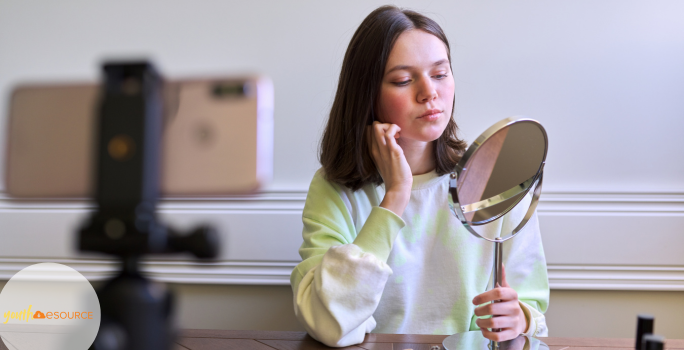Download the PDF for the Conversation Starter Here.
“I hate the way I look.”
“I’m so fat.”
“Delete that photo…my hair is awful today.”
Body image is a constant struggle for many people, especially teenagers. In fact, a reported 86% of women are dissatisfied with their appearance, and 63% of women consider weight the most important thing about themselves. More than 40% of boys in middle school and high school regularly exercise with the goal of increasing muscle mass.[1]
Media and social media trends bolster the misconception that outward looks are essential to success. Influencer culture, peers and how a family talks about bodies can have a huge impact. Everyday issues that adolescents deal with, such as acne breakouts or oily hair, further feelings of self-consciousness. In extreme cases, negative ideas can lead to body dysmorphic disorder, a condition involving obsession over flaws in perceived appearance. This disorder obscures reality and encourages the idea that current appearance is never good enough. Even without an official diagnosis, distortions of physical appearance can rapidly lead to eating disorders and depression, and most definitely dissatisfaction and frustration.
Our task as youth workers is a challenging one. It’s essential to discuss these issues with both males and females, whether or not they outwardly seem to be struggling. We need to think about how our own language (“I need two strong guys…”) can add to or combat a negative body image. We must encourage them to see their identity in Christ alone, not in what others (or they themselves) think they should look like. It is vital to explore body image concerns with teens, confronting the reality of their challenges and reminding them that who they are is far more than mere appearance.
Potential Activities
- Discuss the history of what’s considered “beautiful”: our standards of what is deemed attractive have changed over time. Invite students to browse through some old photographs of appearance trends and talk about how they differ from current ideas. For instance, review the centuries-old thought that pale and plump was associated with the elite, who didn’t have to work outside all day getting tan and muscular (our fitness “ideal” now). Or consider decades-old admiration of body types like Marilyn Monroe (considered gorgeous with curves, but not extremely thin, although not overweight or plus-sized).
- Review basic body biodynamics: In order to function, the human body requires a certain amount of fat for protection and insulation. Fat is not “evil”, but helpful. Give them a chance to explore what their bodies allow them to do. Consider how God created our bodies to allow us to move, love, and care for others.
- Find some fun house-style “warped mirrors” and look at the way they distort figures. Explain that this truly happens sometimes when our minds play tricks on us. We can develop the idea that our bodies look different than others see them. Our own thoughts and ideas are not always reliable when it comes to body image.
- Write lists of positive things that bodies can do. It’s easy for teens to get caught up on the frustrations of how we appear outwardly, and even become angry at the imperfections of body shape and size. To re-direct attention, invite teens to develop lists of things bodies can do for us, such as playing sports, serving others, building things, and praising God.
- Role play: Adolescents might be used to talking down to themselves when it comes to body image. Have them imagine how they might address a young child, or a dear friend who used derisive language. If they wouldn’t tell a loved one that they’re ugly or fat or have bad hair, they shouldn’t use such language against themselves, either.
- For extra fun (with mature audiences), look at the book Song of Solomon. What interesting beauty standards are found in those verses? When was the last time someone was complimented for hair “like a flock of goats”?!
Discussion Questions
- What does it mean that we are made in God’s image? How can this encourage us when we feel “ugly”?
- How would you define beauty? Is physical appearance objective or subjective?
- What does the Bible say about how God made our bodies?
- What does the Bible say about how we treat our bodies?
- How does your body allow you to share the good news of Jesus with others?
- How do you feel about your physical appearance?
- What do you wish you could change about your body? Why?
- What do you think our bodies will be like after the Resurrection?
Foundational Scriptural Truth
Psalm 139:1-14
God designed our lives before our first breath. This Psalm is a reminder of His hand in our lives. God does not make junk! He knows us and loves us, and always has.
Genesis 1:27
This verse recalls an important truth that we know, but sometimes forget to consider in full significance. Each and every one of us is made in God’s image, a precious creation. Our lives are more than bodily appearance, and we are counted marvelous in His eyes.
Matthew 6:25
This whole chapter is a comforting assurance that God cares for us, and we need not be anxious about temporal things. Life is more than just what we put into or on our bodies. Those things can be important, of course, but God will take care of what’s most important. Our role is to seek His kingdom and trust Him.
1 Timothy 4:8
In our culture, we prize and celebrate physical fitness, applauding athletes and those who push their bodies to the ultimate limits. It is great to stay in shape and treat our bodies well, but this verse reminds us that it is even more important to be spiritually fit,
Romans 9:19-23
God made each one of us different and gave us each skills, gifts, and passions. He does this so that His Holy Spirit can work through us for a purpose and to share the good news of Jesus. We should rejoice in how the potter makes us and not compare ourselves to others.
Other Resources
- YouthEsource has some helpful articles regarding body image issues and combatting them. Consider the Bible studies “MADE…in His image” or “Keeping the Body Image Beast at Bay”, or the article “Snark, Crackle, Pop Culture: Am I Ugly?
Basics of body image issues in teens, and how to fight them: https://www.michiganmedicine.org/health-lab/fighting-negative-body-image-issues-kids-and-teens - Causes and challenges of body image issues in young people: https://www.mentalhealth.org.uk/explore-mental-health/articles/body-image-report-executive-summary/body-image-childhood
- Warning signs of body image issues and how to cope: https://raisingchildren.net.au/pre-teens/healthy-lifestyle/body-image/body-image-teens#:~:text=Unhealthy%20pre%2Dteen%20and%20teenage,see%20as%20’ideal’%20bodies.
[1] https://www.nytimes.com/2012/11/19/health/teenage-boys-worried-about-body-image-take-risks.html?pagewanted=all&_r=0







0 Comments